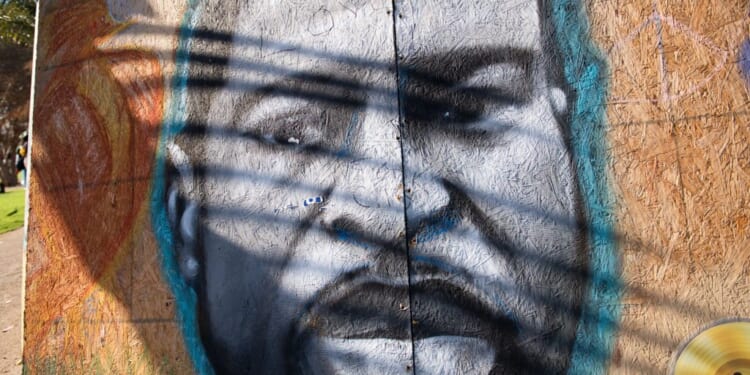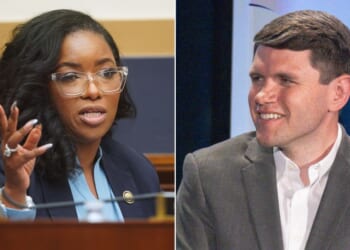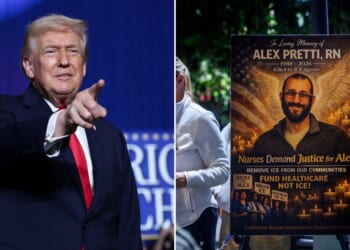May 25, 2020. Minneapolis, Minn. A black man named George Floyd allegedly attempts to pay for a pack of cigarettes with a counterfeit $20 bill. Officers are called to the scene. Within minutes, one of them, Derek Chauvin, has pinned Floyd to the ground, pressing his knee against Floyd’s neck as bystanders record. Floyd gasps for air. “I can’t breathe.” The man dies.
That moment, captured on video and shared with the world, changed the country. Whatever debates linger about the precise medical cause of Floyd’s death, we all saw what happened: a man’s life ebbing away beneath the knee of an officer sworn to protect and serve. The immediate reaction focused on the alleged racial dynamics at work: white cop, black victim.
But was this a racial incident? Or were we just making it one? And what happens when the world ceases to recognize the difference?
The outrage was instant, visceral, and — to a point — understandable. But what struck me then, and still troubles me now, was the totalizing confidence with which commentators, politicians, and activists announced their verdict: George Floyd was murdered because he was black. The phrase “racist cop” became redundant. The nation’s moral diagnosis was rendered before the autopsy had even commenced.
The moral panic that followed Floyd’s death imposed a set of demands on the country at large, but specifically on white Americans: acknowledge the nation’s past and ongoing crimes against African Americans; either submit to “antiracist” reeducation or admit to complicity with America’s ubiquitous white supremacy; accept that whiteness itself confers ineradicable social privilege (regardless of one’s actual social position); acquiesce to biased policies that compromise meritocratic selection processes; and, above all, do not voice any objections.
I worried that white Americans who resented the imposition of these unworkable demands would revolt against them. I worried that a backlash would ensue, and that black Americans, and blackness itself, would bear the brunt of it. And now, five years later, racial politics in the United States have reached an inflection point, and the future of black America hangs in the balance.
The summer of 2020 witnessed the largest protest movement in US history. Millions of people — young and old, white and black, urban and rural — flooded the streets to proclaim that Black Lives Matter. Their anger was not limited to Floyd’s death. They invoked a roll call of tragedies: Trayvon Martin, Eric Garner, Michael Brown, Tamir Rice, Freddie Gray, Ahmaud Arbery, Walter Scott. The litany of the dead took on a universal symbolic meaning that outstripped the evidence: this is what happens to black men in America, because of their race.
However, there was something else animating those demonstrations. After months of confinement during the pandemic, Americans were restless and afraid. Many had lost jobs, loved ones, or simply faith in the institutions that governed their lives. The protests became, in part, a national exorcism — a chance to affirm one’s moral standing in a world turned upside down.
The protests were not entirely baseless. The research of economist Roland Fryer had shown that police use of non-lethal force was indeed more frequent against black suspects than white ones. Yet the movement’s rhetoric quickly escalated to the metaphysical. Protesters called for abolition: of the police, of prisons, of “whiteness” itself. What had begun as a demand for reform metastasized into a crusade against a civilization. Reminders of the great achievements of that civilization — the enshrinement of the rights of free expression and protest, the abolition of slavery, the expansion of full citizenship to all Americans regardless of color, and so on — fell on deaf ears.
This escalation did not come out of thin air. For years, the intellectual soil had been fertilized by theories — not least, Critical Race Theory — that framed America as a systemically racist project whose every structure was implicated in white supremacy. By 2020, these ideas had migrated from the academy into the bloodstream of our public life. Politicians mouthed the movement’s slogans, often without understanding their implications.
Whiteness came to animate even seemingly innocuous institutions and cultural practices, inhabit our speech and thoughts, and possess our history. “Systemic racism” became a liturgical phrase that purported to explain every racial disparity. Corporate executives and elected officials at every level knelt in performative penitence. Schools rewrote curricula to emphasize racial oppression as the organizing principle of the republic.
Many of those who embraced this rhetoric did so cynically — seeking votes, donations, or absolution. Others were simply afraid. Either way, the effect was the same: moral panic masquerading as social criticism. That era’s stunts — the BLM signs in storefront windows, the black avatars on social-media accounts, the demands to “take a knee” at public events, the untold millions spent on struggle sessions at corporate retreats — look in retrospect like embarrassing, panicked attempts to preempt accusations of racism, that did nothing about inequality in the end.
The irony is that the people most harmed were the black Americans in whose name this theater was performed. Calls to “defund the police” produced predictable results: officers pulled back from proactive policing. Fryer’s later research documented what followed — rising homicide rates that disproportionately victimized black residents. To those proclaiming that Black Lives Matter, the black lives themselves were apparently beside the point. Meanwhile, resentment grew in those who disagreed with these self-conscious displays of faux-solidarity, but feared the consequences of saying so.
I feared this outcome from the start. What worried me most was not that the Black Lives Matter movement would succeed in “abolishing” anything, but that it would provoke a furious reaction. And so it has.
When people are compelled to mouth pieties they do not believe — when they must sit through hours of racial-sensitivity trainings, nodding along to theories that brand them as beneficiaries of invisible systems of guilt — resentment festers. Such “spirals of silence,” to borrow a phrase from political scientist Elisabeth Noelle-Neumann, are unstable. They end abruptly, when someone decides to call the bluff. That moment arrived, in part, with Donald Trump.
“The future of black America hangs in the balance.”
Trump’s 2020 campaign drew strength from the backlash against progressive overreach. He presented himself as the tribune of the silenced, the man who would say aloud what others only whispered. His supporters were not, for the most part, the caricatured racists of media imagination. They were, in the main, ordinary Americans who felt unjustly accused — white citizens born long after Jim Crow, bewildered at being told that their country and their color made them complicit in murder, and angry at the institutions that, they felt, abetted their exclusion from respectability and honor.
The reactionary energies unleashed by that resentment have not yet subsided. We see them today in the rollback of affirmative action, the shuttering of diversity offices, and the rise of aggressive “anti-woke” politics. Granted, some of these developments were overdue; many of those programs had outlived their usefulness. But this backlash comes with a creeping repudiation not only of racial politics, but of blackness itself.
By this I mean not a wholesale excision of blackness from public discourse, but a constellation of phenomena that view blackness as a cause for skepticism. Black public employees regularly face, without evidence, charges of being “DEI hires” — a code phrase meant to imply incompetence. Videos of black teens acting out circulate with comments suggesting that we should expect nothing better. The Trump administration has scrubbed mention of historic black figures — like Harriet Tubman and the Tuskegee Airmen — from government websites. After the chaos of 2020, an increasingly vocal segment of the country seems eager to wash its hand of what it regards as an unassimilable minority.
We might ask why such elisions would be wrong, given the excesses of 2020. For in this moment of retrenchment, it is tempting to retreat to a comforting slogan: colorblindness. Indeed, conservatives have, with varying degrees of sincerity, championed colorblindness as an antidote to the lingering effects of societal bias, and as an alternative to post-Civil Rights Movement entitlements. This sounds plausible. Indeed, I have long argued that colorblindness is a necessary condition of social justice. But it is not sufficient.
True justice in matters of race requires more than the refusal to see color; it demands the cultivation of conditions under which color ceases to determine opportunity. A just society would not be indifferent to this concern. To allow blindness to justify indifference is to betray the very ideals of the Civil Rights Movement. One needn’t be a critical race theorist to appreciate this point.
We can acknowledge racial disparities without invoking the language of white supremacy. And we can pursue equality without promoting guilt or resentment. The work of the great reformers of the 20th century remains incomplete — not because they failed, but because their victories created new, more subtle challenges. To complete their work, we must balance two imperatives: to transcend race as a moral category; and to honor the historical particularity of the black experience.
Implicit in those aims is an underlying claim about identity: blackness has content that is relevant to American politics. It is not, as some would have it, a matter of genetics or phenotype. It is the inheritance of a history: of slavery and emancipation, of migration and struggle, of spiritual creativity and cultural innovation. It is a social and moral formation — an evolving conversation among those whose forebears endured a particular ordeal and made of it something enduring. To be black in America is to inhabit an existential predicament shaped by that past. It is to grapple with the meaning of freedom in a country that once denied your ancestors their humanity. It is to claim a stake in the American story not as perpetual victim or permanent outsider, but as co-author.
That past is plural. There is no single “black experience.” The son of Nigerian immigrants in Houston does not share the same historical consciousness as the descendant of slaves in Mississippi. Yet both participate, however differently, in the ongoing project of defining what blackness means in the 21st century.
To imagine that the end of racial politics will mean the end of race itself is to mistake the symptom for the substance. We may aspire to a future in which racial identity no longer structures opportunity or moral worth. But we should not yearn for a future in which the memory of blackness — its music, its language, its ironies, and insights — has been erased. And that is what the anti-race backlash threatens to do.
Preserving that memory entails acknowledging that the racial question in America is changing. The old binary of black and white, which structured the politics of the 20th century, is giving way to a mosaic. Immigration has diversified the country. Hispanic, Asian, and multiracial Americans are reshaping the demographic and cultural landscape.
In this new dispensation, the claims once made in the name of “the Negro” or “the black community” may carry less political weight. The vocabulary of guilt and redress that dominated midcentury liberalism is losing its purchase. The very category of “race,” as a political identity, is being transformed apace with the nation’s demographics.
That is not necessarily a bad thing. But where does it leave blackness?
It could wither into irrelevance — reduced to a museum exhibit, a set of grievances recited on anniversaries, a dead limb on the political body. Or it could evolve into something richer: a cultural inheritance accessible to all Americans, a moral resource for understanding suffering, resilience, and renewal.
The choice is ours.
The task before us is not to erase race from public life, but to reimagine its meaning. The formal remedies that remain — equal access to quality education, fair enforcement of the law, investment in families and communities — should aim not to privilege, but to prepare. We must attend to the formation of our citizens in addition to the fairness of our procedures. But while we rightly prize meritocracy, it loses its moral force under conditions where individuals experience sometimes vastly unequal opportunity to acquire skills, knowledge, and experience. Rightly understood, meritocracy is not the cold calculus of test scores, but the cultivation of human potential across lines of class and color. This is a thick meritocracy, grounded in opportunity and responsibility alike.
In the face of persistent racial disparities, the alternative is grim: a society divided between those who weaponize grievance and those who hide behind denial; a politics oscillating between sentimental guilt and punitive backlash. We already have an inkling of what such a society could look like: hobbled democratic institutions, ethnic tensions, loose talk of civil war, and increasing social and geographical segregation between those with conflicting beliefs.
It was not inevitable that the summer of George Floyd would lead us this close to the brink. But I fear it has. The lesson to draw from that moment is neither that America is irredeemably racist, nor that race shouldn’t matter. Rather, we must distinguish between seeing race and being ruled by it.
Many years ago, when I began writing about race for a public audience, I declared that the Civil Rights Movement was over — that the strategies, programs, and policies of the past were unfit for the present. But the spirit of that movement — in its ambitions for true equality to reign as the guiding principle of the nation as a whole — is still alive. Its work remains unfinished, and we must complete it.

















